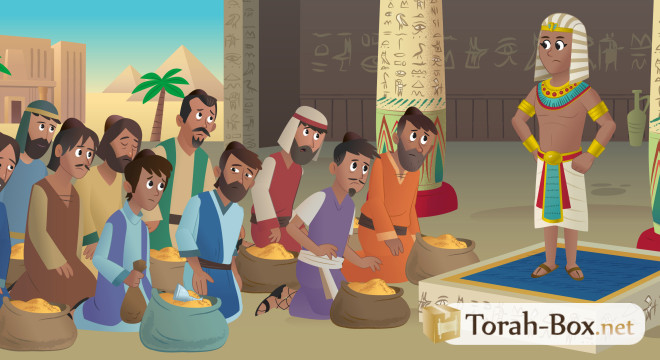
Vayigash
Vayigash: Yosef's Proof
“They went up from Egypt and came to the land of Canaan to Yaakov their father. And they told him, saying, ‘Yosef is still alive’ and that he is ruler over all the land of Egypt; but his heart rejected it for he did not believe them.” However, when they related to him all the words that Yosef had spoken to them, and he saw the wagons that Yosef had sent to transport him, then the spirit of their father, Yaakov, was lifted.[1]”
When the brothers returned from their momentous reunion with Yosef, they told Yaakov Avinu the astounding news that his beloved son was still alive. However he was not convinced by all their efforts to persuade him and he only accepted the news when they showed him the wagons that Yosef had sent. What was so special about the wagons? Rashi quotes the Medrash Tanchuma that explains that the wagons were a simun of the Mitzva of Egla Arufah[2]which was the final thing that Yaakov had taught Yosef. This simun finally convinced Yaakov that his son was really alive[3]. The Darchei Mussar asks that Yosef could surely have given any number or proofs that he was not an impostor. Why did he choose to give this particular simun[4]? Furthermore, why did this evidence supersede everything that the brothers could say to prove that this was really Yosef?
The Darchei Mussar answers with a fascinating story involving the Vilna Gaon zt”l. There was a woman whose husband had been lost for many years and she was in the status of aguna. Suddenly, a man returned claiming that he was the missing husband. He gave many simunim that seemed to prove beyond reasonable doubt that he was indeed her husband, however, she remained uncertain of his true identity. Unsure what to do, the people involved came to the Vilan Gaon to ask him the course of action. He advised them to bring this man to the shul that the husband had attended, and test him by telling him to sit in his makom kavua[5]. The man did not know where the makom kavua was and admitted that he was not this woman’s husband. Evidently, he had met the husband at some point and found out many private details about him as part of his plan. The Vilna Gaon explained that he realized that it was conceivable that this man had met the true husband and asked him questions about his life that enabled him to convincingly pose as the husband himself. However, if this man was really an impostor who was planning to commit such an evil act of deceit, then it was impossible that he would think to ask the true husband about a davar sheb’kedusha[6]. It was inconceivable that such a rashawould have thoughts of kedusha because they were so distant from his headspace.
With this story, the Darchei Mussar explains why Yosef sent his father a simunof the last piece of Torah that they learnt together. If the Egyptian Viceroy was an impostor of Yosef he would never think to have asked Yosef a matter pertaining to ruchnius. Thus Yosef knew that only something relating to kedusha would convince his father that he was the same Yosef that left so many years earlier. The Darchei Mussar continues further that this simun also served as an excellent proof that Yosef had maintained his high spiritual standing because had he been negatively influenced in Mitzrayim he never would have thought to send a simun relating to Torah.
We learn from this explanation that the things that occupy a person’s thoughts and make up his speech give a very strong indication of his spiritual standing. A person who devotes much of his thinking and conversation to matters of ruchnius shows that his penimius[7]is saturated with kedusha. For example, when the famed Rogatchover Gaon zt”l was about to undergo an operation, one observer noted that he suspected that when the surgeon would cut the Rogatchover’s skin, Torah would come pouring out! He was so full of Torah that it constituted his very essence.
In contrast, a person who devotes much of his conversation to intrinsically meaningless matters gives an indication that his penimiusis not saturated with spirituality. A person may diligently learn Torah when he is in the Beis HaMedrash but he should also ask himself what he talks about in his ’spare time’? There is nothing necessarily wrong with discussing the news and business matters to a certain degree but they should surely not constitute the majority of one’s conversation. An important aspect of self-growth is to develop an appreciation of spiritual matters such as Torah and chesed to the extent that they dominate one's thinking and speech. A paradigm of such a level was the Chofetz Chaim zt“l. It is said that he was a very talkative person - what did he talk about? Torah and matters pertaining to the spiritual welfare of Klal Yisroel.
We learn from Yosef’s simunim that that which occupies a person’s minds is a great indication of where he is holding - may we all merit to think and speak words of true spiritual depth.
[1] Vayigash, 45:25-27.
[2] Literally translated as the ‘axed heifer’ See Parshas Shoftim, 20:1-9 for details of this Mitzva.
[3] Rashi, Vayigash, 45:27.
[4] Darchei Mussar, Parshas Vayigash, p.92. (Darchei Mussar was authored by Rav Yaakov Neimann zt”l).
[5] The specific seat where a person sits.
[6] Literally translated as ‘a holy matter’.
[7] Internal character.
Torah-Box.net Account
To access the entire Torah-Box.net website, sign up for free in less than a minute.
Weekly Parsha
 Candle Lighting - New York
Candle Lighting - New York
Friday February 20th, 2026 at 17:18 *Shabbat ends at 18:20 *
change my location
* Times given as an indication, check the times of your community










